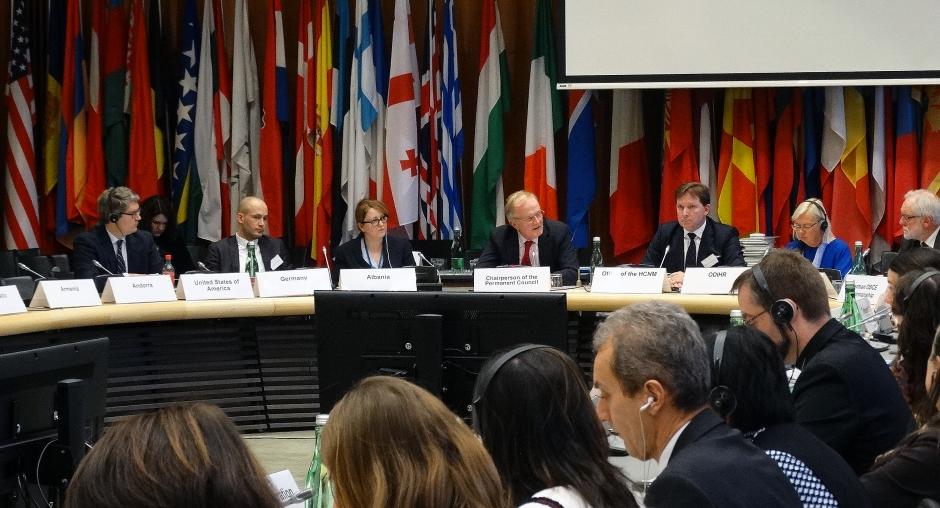OSCE meeting in Vienna explores the bridge building role and potential of national minority issues across the OSCE area

VIENNA, 10 November 2016 – Promoting greater attention to the positive potential of national minorities for societies and states was a core theme of speakers at the opening of a two-day OSCE Supplementary Human Dimension Meeting (SHDM) held in Vienna today, entitled “National Minorities, Bridge Building and Integration.”
The last of three Supplementary Human Dimension Meetings to be held in 2016 is organized by Germany’s 2016 OSCE Chairmanship, the OSCE Office for Democratic Institutions and Human Rights (ODIHR) and the OSCE High Commissioner on National Minorities (HCNM). It relates to a research project initiated by the OSCE Chairmanship and co-ordinated by the HCNM to explore bridge building opportunities that exist in diverse societies and to identify those policies and mechanisms which can transform these opportunities into reality.
Eberhard Pohl, Germany’s Ambassador to the OSCE and current Chair of the OSCE Permanent Council, opened the meeting and welcomed that a priority theme of the German Chairmanship will be at the centre of discussions among the more than 190 participants from government authorities, academia and civil society from across the OSCE region. “Where rights of national minorities are respected, where national minorities are an integral part of the society, diverse societies can serve to build bridges across states and cultures,” he said.
The Director and Officer-in-Charge of the HCNM, Henrik Villadsen also speaking at the opening session, said: “The concept of using minority-majority relations as “bridge-builders” takes its point of departure in the opportunities which lie in the variety of connections that can be built upon within diverse societies. Such connections can be – and are being – used positively to promote peace, security and economic development both within and between States.”
“The involvement of national minorities in the various aspects of life is an important factor for their integration and for the prevention of conflicts,” said Katarzyna Jarosiewicz-Wargan, ODIHR First Deputy Director. “ODIHR is co-operating with the HCNM to support effective and meaningful participation of national minorities in public and political life and the protection of their rights, as recognized by international human rights standards.”
In his keynote speech, Rainer Hofmann, Professor of Constitutional Law, Public International Law and European Law, at Goethe University in Frankfurt am Main said: “Let us not forget that diversity is an enrichment and not a threat, and that national minorities by their very nature add to such diversity by their inherent role of bridge builders. Diversity is something we should appreciate and not be afraid of.”
In three discussion sessions that are to follow, panellists will discuss the application of HCNM guidelines, and how the integration of policies and tools for inter-state co-operation can foster social cohesion and serve as bridges between communities. Good practices from across the OSCE area will be shared focusing on three areas: legal mechanisms for bridge building across States; promoting the bridge building role of national minority issues across various policy areas; and empowering civil society to build bridges on the grassroots level.
For further information, please contact:
In Warsaw, Thomas Rymer (ODIHR spokesperson): +48-609-522-266 (mobile); or [email protected]
In The Hague, Kyra Koponen (HCNM media contact): +31-70-312-5513; +31-6-531-78712 (mobile); or [email protected]
